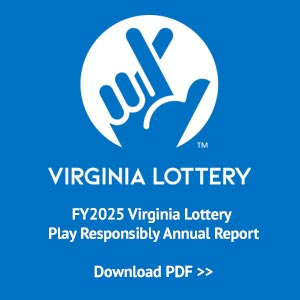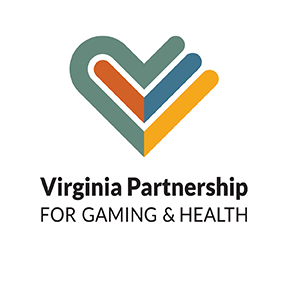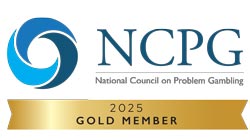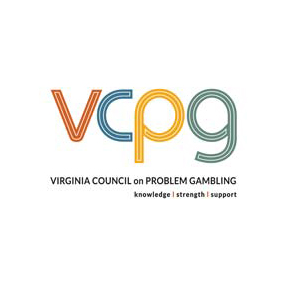- Home
- Playing Matters
- Play Responsibly
-
Play Responsibly
-
Gift Responsibly
-
Responsible Gambling Tools
-
Understanding the Odds
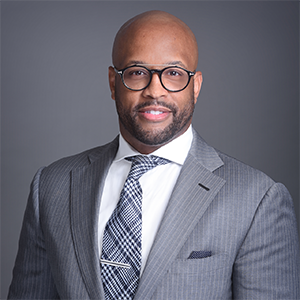
“The Virginia Lottery is committed to providing our products ethically and responsibly with a continuous focus on finding ways to evolve our Responsible Gaming efforts for the benefit of all of our players. We have and will continue to raise awareness of problem gambling and the resources available in the Commonwealth that can help. We know that we are not alone in our efforts, but we are devoted to doing our part.”
- Khalid Jones, Executive Director, Virginia Lottery
There are many forms of gambling in Virginia, some of which are run or regulated by the Virginia Lottery and some of which are not. Gambling can be buying a lottery ticket, playing a slot machine, betting on sports, table games, even buying into a workplace pool for March Madness.
Most people can gamble and play games of chance without any ill effects. However, for some people, gambling is an addiction that can ruin lives and families.
Problem gambling doesn’t necessarily mean losing bets or even gambling a lot. It means a lack of control. To a person with a gambling problem, the act of placing a wager has much the same effect on the brain as an alcoholic drinking alcohol. It is a recognized mental illness, and it is treatable.
The Virginia Lottery’s Play Responsibly campaign has been recognized at the state and national levels. The Virginia Lottery was one of the first lotteries nationwide to be certified under the Responsible Gambling Verification Program, a joint program of the National Council on Problem Gambling (NCPG) and the North American Association of State and Provincial Lotteries (NASPL).
The Virginia Problem Gambling Helpline
888-532-3500
Call / text / chat
Play Responsibly
The Virginia Lottery recognizes that while most people can play games of chance without ill effects, there are some people for whom gambling of any sort can be destructive.
The Lottery will, at all times, provide its games in the most responsible manner possible and encourage responsible play by all who choose to do so. This includes working to ensure that Virginia Lottery tickets are not sold to, nor prizes redeemed by, anyone younger than 18.
The “Play Responsibly” logo is to be displayed on as many advertising materials as possible. The logo is to include a toll-free telephone number where anyone with questions or concerns about problem gambling can go for themselves or loved ones. The Lottery, in partnership with the Virginia Council on Problem Gambling, will ensure the phone line is staffed by knowledgeable and helpful individuals 24 hours a day, seven days a week. As required by law, all scratchers and computer-generated tickets will have the phone number printed on the back.
The Lottery will make use of its primary website, www.valottery.com, to maintain a page devoted to problem gambling, which is to include information on gambling addiction, the Lottery’s toll-free helpline number, PSA(s), links, etc.
The Lottery will work closely with state and national advocacy groups, including but not limited to, the Virginia and National Councils on Problem Gambling. This includes active participation in National Problem Gambling Awareness Month and the Holiday Campaign to discourage gifting lottery tickets to minors. The Lottery will strive to achieve and maintain Responsible Gaming Verification status by working and improving in the following areas:
- Research
- Employee Training
- Retailer Training
- Player Education
- New/Existing Product Oversight
- Budget
- Advertising
- Engagement and Awareness
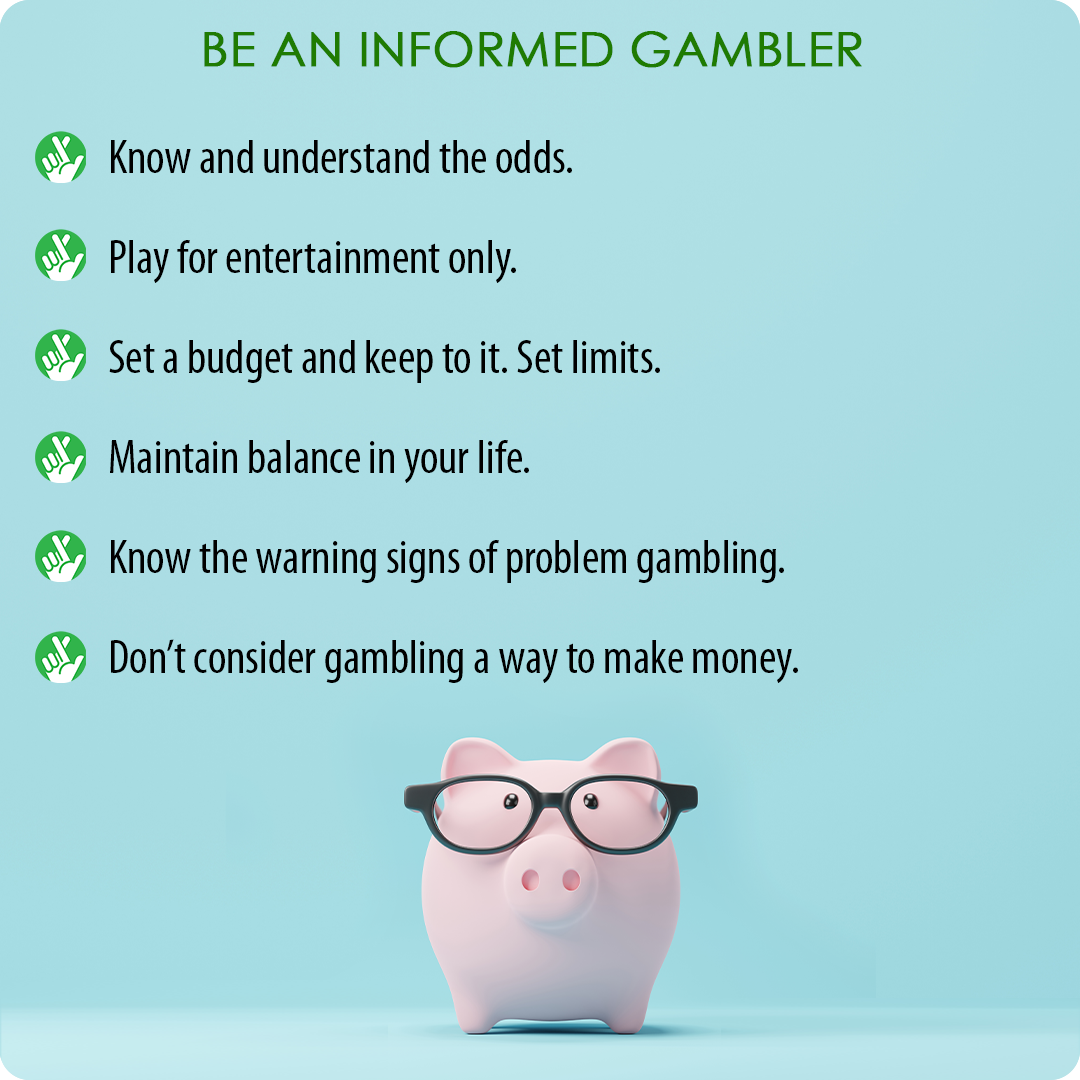
The Lottery will continue to produce television and radio public service announcements in English and Spanish encouraging responsible play and make those spots available to broadcast outlets statewide. When speaking to media, Lottery spokespersons will take every practical opportunity to remind players of the importance of playing responsibly.
At all times, the Lottery will continue to look for additional ways to get its Play Responsibly message to all players.

Gift Responsibly
A lot of people give Virginia Lottery tickets as gifts, not just during the holidays, but throughout the year. However, it’s important to consider the age of the person receiving the gift. Remember: lottery tickets are never appropriate gifts for anyone younger than 18.
The Virginia Lottery, along with the Virginia Council on Problem Gambling, is working to raise awareness of the nationwide Gift Responsibly campaign and of the dangers of youth gambling.
According to Carolyn Hawley, Ph.D., President of the Virginia Council on Problem Gambling, “The earlier in life a young person starts to gamble, the more likely they are to develop gambling problems later on. Please remember that lottery tickets are not toys.”

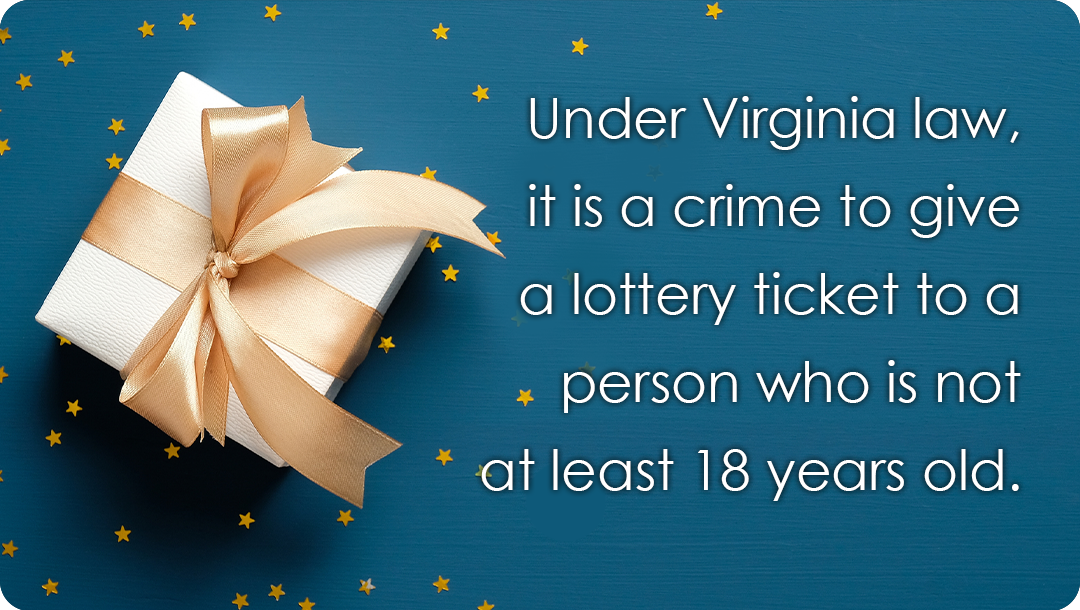
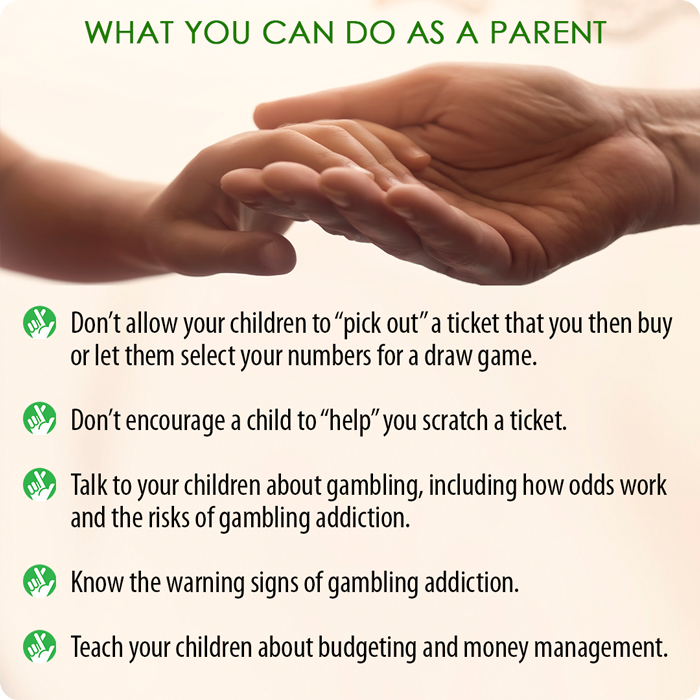
Responsible Gambling Tools
The Virginia Problem Gambling Helpline
888-532-3500
Call / text / chat
Free and Confidential
Problem Gambling Links
- Virginia Council on Problem Gambling
- The National Council on Problem Gambling
- Annual Problem Gambling Awareness Month
- Gamblers Anonymous
Voluntary Exclusion Program
The Virginia Lottery has instituted a self-help program for individuals that wish to voluntary exclude themselves from Virginia casino gaming establishments, sports betting, account-based lottery as well as gaming activities administered by the Office of Charitable and Regulatory Programs and the Virginia Racing Commission. Individuals may self-exclude for a period of two-years, five-years or a lifetime. Sign up or find out more about the Voluntary Exclusion Program.

Frequently asked questions
Q: What is problem gambling?
A: Problem gambling includes all gambling behavior patterns that compromise, disrupt or damage personal, family or vocational pursuits. The essential features are increasing preoccupation with gambling, a need to bet more money more frequently, restlessness or irritability when attempting to stop, "chasing" losses, and loss of control manifested by continuation of the gambling behavior in spite of mounting, serious, negative consequences. In extreme cases, problem gambling can result in financial ruin, legal problems, loss of career and family, or even suicide.
Q: Where can I go for help?
A: A good place to start is the Virginia Problem Gambling Helpline, which offers you the ability to talk, chat or text with a problem gambling counselor. 1-888-532-3500.
Q: Isn't problem gambling just a financial problem?
A: No. Problem gambling is an emotional problem that has financial consequences. If you pay all of a problem gambler's debts, the person will still be a problem gambler. The real problem is that he or she has an uncontrollable obsession with gambling.
Q: What kind of people become problem gamblers?
A: Anyone who gambles can develop problems if they are not aware of the risks and do not gamble responsibly. When gambling behavior interferes with finances, relationships and the workplace, a serious problem already exists.
Q: What causes problem gambling?
A: The cause of a gambling problem is the individual's inability to control the gambling. This may be due in part to a genetic tendency to develop addiction, one's ability to cope with normal life stress and even one's social upbringing and moral attitudes about gambling. The casino or lottery provides the opportunity for the person to gamble. It does not, in and of itself, create the problem any more than a liquor store would create an alcoholic.
Q: Can you be a problem gambler if you don't gamble every day?
A: The frequency of a person's gambling does not determine whether or not he or she has a gambling problem. Even though the problem gambler may only go on periodic gambling binges, the emotional and financial consequences will still be evident.
Q: How much money do you have to lose to have a gambling problem?
A: The amount of money lost or won does not determine when gambling becomes a problem. Gambling becomes a problem when it causes a negative impact on any area of the individual's life.
Q: Are problem gamblers usually addicted to other things too?
A: It is generally accepted that people with one addiction are more at risk to develop another. Some problem gamblers also find they have a problem with alcohol or drugs. This does not, however, mean that if you have a gambling problem you are guaranteed to become addicted to other things. Some problem gamblers never experience any other addiction because no other substance or activity gives them the same feeling as the gambling does. There also appears to be evidence of family patterns regarding dependency as many problem gamblers report one or both parents had a drinking and or gambling problem.
Q: How widespread is problem gambling in the U.S.?
A: Two million U.S. adults (1% of the population) are estimated to meet the criteria for pathological gambling in a given year. Another 4 million to 8 million (2% - 3%) would be considered problem gamblers: They do not meet the full diagnostic criteria for pathological gambling, but they meet one or more of the criteria and are experiencing problems due to their gambling behavior. Research also indicates that most adults who choose to gamble are able to do so responsibly.
Understanding the odds
Odds can be a helpful tool when playing a lottery game. Understanding the odds in a game can you be a more informed player. However, odds can be misunderstood. If you’re going to play baseball or football, you’d want to understand the rules and how the game works before you walk on the field. Understanding the odds in any game of chance can make playing more fun and help you keep the game from getting out of hand.
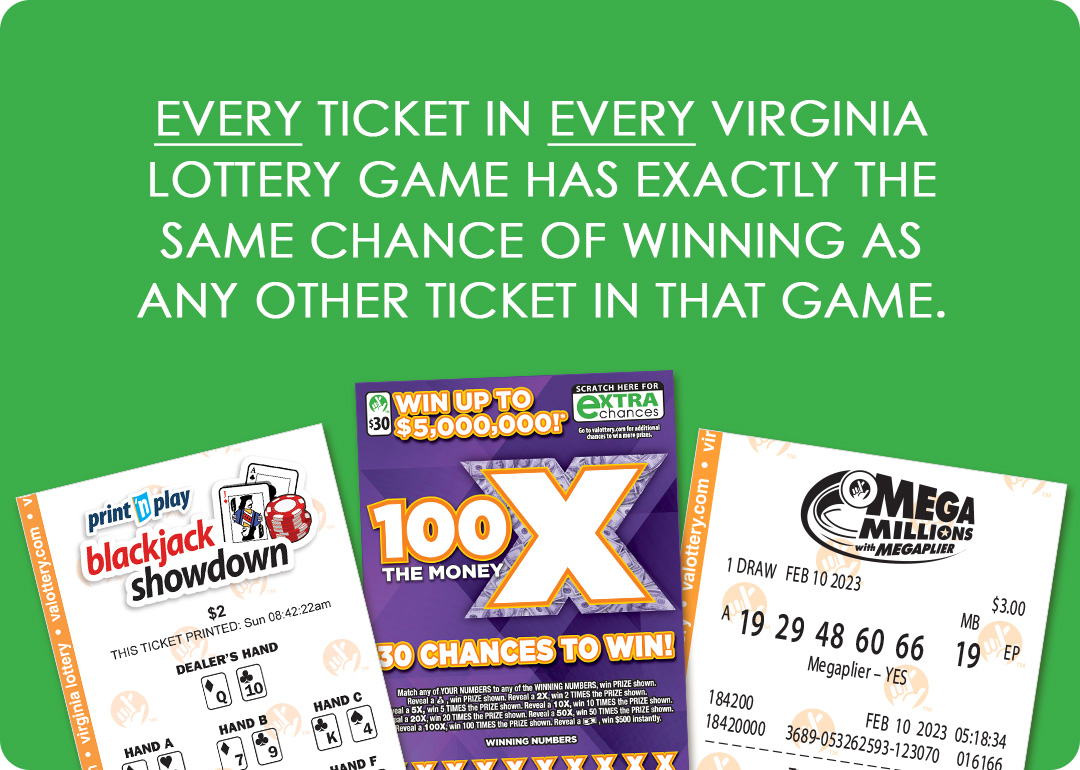
What are odds in a Lottery game?
- In scratcher games: Odds are a calculation of the number of winning tickets for that game, across the entire state, compared to the total number of tickets in that game.
- In drawing games: The odds reflect every possible combination of numbers that could come out in a drawing. When a Mega Millions drawing is held, there are 302,575,350 possible different ways the numbers can come out. So the odds of matching all six numbers with a single ticket are 1 in 302,575,350.
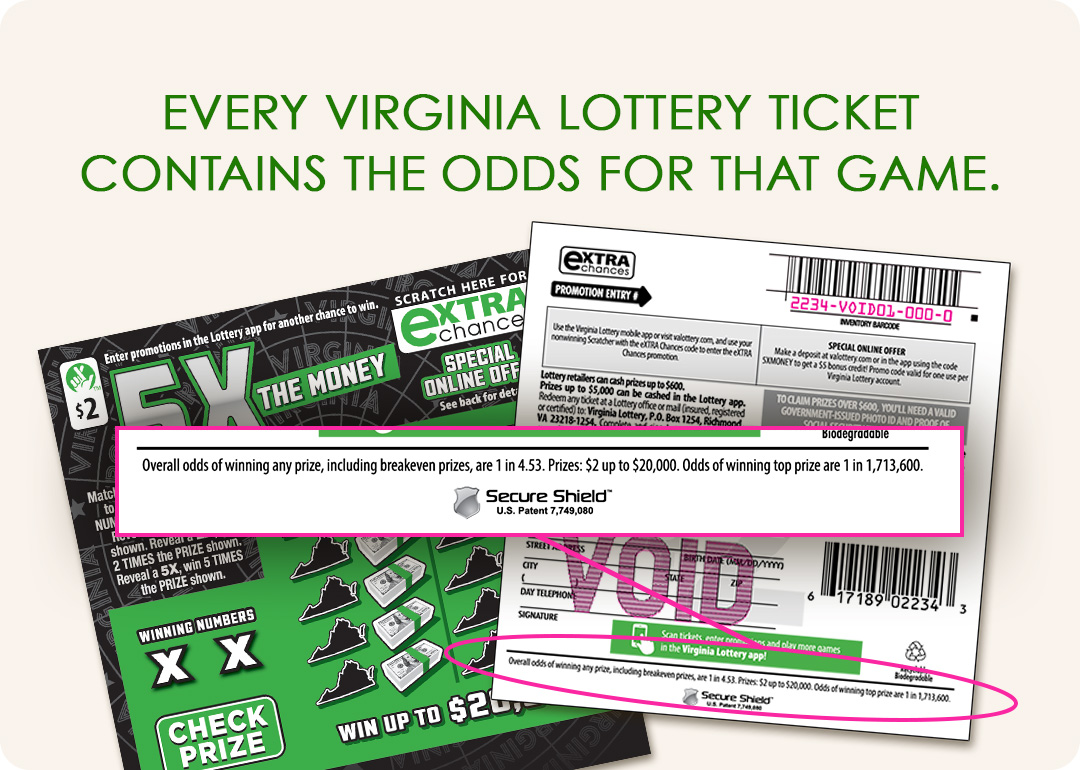
Misperceptions about odds:
- Odds do not guarantee a specific result. If the odds are 1 in 4, that doesn’t mean if you buy four tickets, one will be a winner. One could be a winner – or two, or three, or even four – or none at all.
- You don’t improve your odds of winning by buying your ticket in a certain city, a certain store or a certain part of the state.
- Every time you play, the odds are the same. If you’ve been playing and you haven’t won in several plays, it doesn’t mean you are “due” a win.
- Playing the same numbers over and over again doesn’t improve or change the odds of winning.
- Whether you select your own numbers or let the computer select your numbers, the odds remain the same.
- Odds in a lottery game have nothing to do the with the number of people playing. (Note: There’s a difference between Lottery games and raffle games. Odds in raffle games do depend on the number of people/tickets involved.).
Play Responsibly

“The Virginia Lottery is committed to providing our products ethically and responsibly with a continuous focus on finding ways to evolve our Responsible Gaming efforts for the benefit of all of our players. We have and will continue to raise awareness of problem gambling and the resources available in the Commonwealth that can help. We know that we are not alone in our efforts, but we are devoted to doing our part.”
- Khalid Jones, Executive Director, Virginia Lottery
There are many forms of gambling in Virginia, some of which are run or regulated by the Virginia Lottery and some of which are not. Gambling can be buying a lottery ticket, playing a slot machine, betting on sports, table games, even buying into a workplace pool for March Madness.
Most people can gamble and play games of chance without any ill effects. However, for some people, gambling is an addiction that can ruin lives and families.
Problem gambling doesn’t necessarily mean losing bets or even gambling a lot. It means a lack of control. To a person with a gambling problem, the act of placing a wager has much the same effect on the brain as an alcoholic drinking alcohol. It is a recognized mental illness, and it is treatable.
The Virginia Lottery’s Play Responsibly campaign has been recognized at the state and national levels. The Virginia Lottery was one of the first lotteries nationwide to be certified under the Responsible Gambling Verification Program, a joint program of the National Council on Problem Gambling (NCPG) and the North American Association of State and Provincial Lotteries (NASPL).
The Virginia Problem Gambling Helpline
888-532-3500
Call / text / chat
Play Responsibly
The Virginia Lottery recognizes that while most people can play games of chance without ill effects, there are some people for whom gambling of any sort can be destructive.
The Lottery will, at all times, provide its games in the most responsible manner possible and encourage responsible play by all who choose to do so. This includes working to ensure that Virginia Lottery tickets are not sold to, nor prizes redeemed by, anyone younger than 18.
The “Play Responsibly” logo is to be displayed on as many advertising materials as possible. The logo is to include a toll-free telephone number where anyone with questions or concerns about problem gambling can go for themselves or loved ones. The Lottery, in partnership with the Virginia Council on Problem Gambling, will ensure the phone line is staffed by knowledgeable and helpful individuals 24 hours a day, seven days a week. As required by law, all scratchers and computer-generated tickets will have the phone number printed on the back.
The Lottery will make use of its primary website, www.valottery.com, to maintain a page devoted to problem gambling, which is to include information on gambling addiction, the Lottery’s toll-free helpline number, PSA(s), links, etc.
The Lottery will work closely with state and national advocacy groups, including but not limited to, the Virginia and National Councils on Problem Gambling. This includes active participation in National Problem Gambling Awareness Month and the Holiday Campaign to discourage gifting lottery tickets to minors. The Lottery will strive to achieve and maintain Responsible Gaming Verification status by working and improving in the following areas:
- Research
- Employee Training
- Retailer Training
- Player Education
- New/Existing Product Oversight
- Budget
- Advertising
- Engagement and Awareness

The Lottery will continue to produce television and radio public service announcements in English and Spanish encouraging responsible play and make those spots available to broadcast outlets statewide. When speaking to media, Lottery spokespersons will take every practical opportunity to remind players of the importance of playing responsibly.
At all times, the Lottery will continue to look for additional ways to get its Play Responsibly message to all players.

Gift Responsibly
Gift Responsibly
A lot of people give Virginia Lottery tickets as gifts, not just during the holidays, but throughout the year. However, it’s important to consider the age of the person receiving the gift. Remember: lottery tickets are never appropriate gifts for anyone younger than 18.
The Virginia Lottery, along with the Virginia Council on Problem Gambling, is working to raise awareness of the nationwide Gift Responsibly campaign and of the dangers of youth gambling.
According to Carolyn Hawley, Ph.D., President of the Virginia Council on Problem Gambling, “The earlier in life a young person starts to gamble, the more likely they are to develop gambling problems later on. Please remember that lottery tickets are not toys.”



Responsible Gambling Tools
Responsible Gambling Tools
The Virginia Problem Gambling Helpline
888-532-3500
Call / text / chat
Free and Confidential
Problem Gambling Links
- Virginia Council on Problem Gambling
- The National Council on Problem Gambling
- Annual Problem Gambling Awareness Month
- Gamblers Anonymous
Voluntary Exclusion Program
The Virginia Lottery has instituted a self-help program for individuals that wish to voluntary exclude themselves from Virginia casino gaming establishments, sports betting, account-based lottery as well as gaming activities administered by the Office of Charitable and Regulatory Programs and the Virginia Racing Commission. Individuals may self-exclude for a period of two-years, five-years or a lifetime. Sign up or find out more about the Voluntary Exclusion Program.

Frequently asked questions
Q: What is problem gambling?
A: Problem gambling includes all gambling behavior patterns that compromise, disrupt or damage personal, family or vocational pursuits. The essential features are increasing preoccupation with gambling, a need to bet more money more frequently, restlessness or irritability when attempting to stop, "chasing" losses, and loss of control manifested by continuation of the gambling behavior in spite of mounting, serious, negative consequences. In extreme cases, problem gambling can result in financial ruin, legal problems, loss of career and family, or even suicide.
Q: Where can I go for help?
A: A good place to start is the Virginia Problem Gambling Helpline, which offers you the ability to talk, chat or text with a problem gambling counselor. 1-888-532-3500.
Q: Isn't problem gambling just a financial problem?
A: No. Problem gambling is an emotional problem that has financial consequences. If you pay all of a problem gambler's debts, the person will still be a problem gambler. The real problem is that he or she has an uncontrollable obsession with gambling.
Q: What kind of people become problem gamblers?
A: Anyone who gambles can develop problems if they are not aware of the risks and do not gamble responsibly. When gambling behavior interferes with finances, relationships and the workplace, a serious problem already exists.
Q: What causes problem gambling?
A: The cause of a gambling problem is the individual's inability to control the gambling. This may be due in part to a genetic tendency to develop addiction, one's ability to cope with normal life stress and even one's social upbringing and moral attitudes about gambling. The casino or lottery provides the opportunity for the person to gamble. It does not, in and of itself, create the problem any more than a liquor store would create an alcoholic.
Q: Can you be a problem gambler if you don't gamble every day?
A: The frequency of a person's gambling does not determine whether or not he or she has a gambling problem. Even though the problem gambler may only go on periodic gambling binges, the emotional and financial consequences will still be evident.
Q: How much money do you have to lose to have a gambling problem?
A: The amount of money lost or won does not determine when gambling becomes a problem. Gambling becomes a problem when it causes a negative impact on any area of the individual's life.
Q: Are problem gamblers usually addicted to other things too?
A: It is generally accepted that people with one addiction are more at risk to develop another. Some problem gamblers also find they have a problem with alcohol or drugs. This does not, however, mean that if you have a gambling problem you are guaranteed to become addicted to other things. Some problem gamblers never experience any other addiction because no other substance or activity gives them the same feeling as the gambling does. There also appears to be evidence of family patterns regarding dependency as many problem gamblers report one or both parents had a drinking and or gambling problem.
Q: How widespread is problem gambling in the U.S.?
A: Two million U.S. adults (1% of the population) are estimated to meet the criteria for pathological gambling in a given year. Another 4 million to 8 million (2% - 3%) would be considered problem gamblers: They do not meet the full diagnostic criteria for pathological gambling, but they meet one or more of the criteria and are experiencing problems due to their gambling behavior. Research also indicates that most adults who choose to gamble are able to do so responsibly.
Understanding the Odds
Understanding the odds
Odds can be a helpful tool when playing a lottery game. Understanding the odds in a game can you be a more informed player. However, odds can be misunderstood. If you’re going to play baseball or football, you’d want to understand the rules and how the game works before you walk on the field. Understanding the odds in any game of chance can make playing more fun and help you keep the game from getting out of hand.

What are odds in a Lottery game?
- In scratcher games: Odds are a calculation of the number of winning tickets for that game, across the entire state, compared to the total number of tickets in that game.
- In drawing games: The odds reflect every possible combination of numbers that could come out in a drawing. When a Mega Millions drawing is held, there are 302,575,350 possible different ways the numbers can come out. So the odds of matching all six numbers with a single ticket are 1 in 302,575,350.

Misperceptions about odds:
- Odds do not guarantee a specific result. If the odds are 1 in 4, that doesn’t mean if you buy four tickets, one will be a winner. One could be a winner – or two, or three, or even four – or none at all.
- You don’t improve your odds of winning by buying your ticket in a certain city, a certain store or a certain part of the state.
- Every time you play, the odds are the same. If you’ve been playing and you haven’t won in several plays, it doesn’t mean you are “due” a win.
- Playing the same numbers over and over again doesn’t improve or change the odds of winning.
- Whether you select your own numbers or let the computer select your numbers, the odds remain the same.
- Odds in a lottery game have nothing to do the with the number of people playing. (Note: There’s a difference between Lottery games and raffle games. Odds in raffle games do depend on the number of people/tickets involved.).











